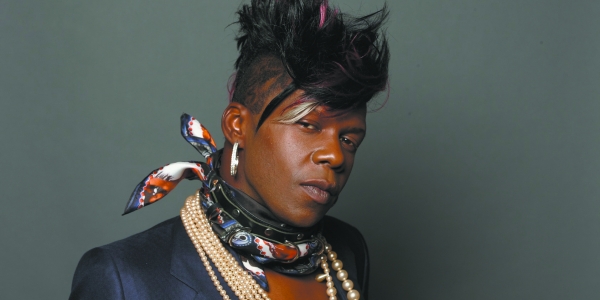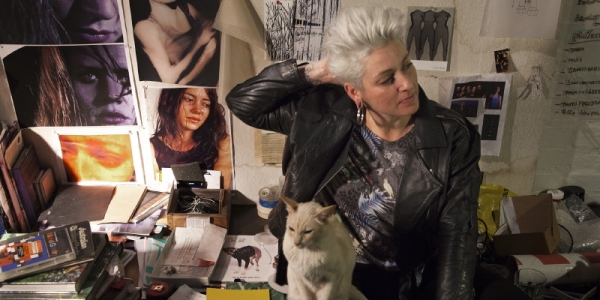Bounce began 20 years ago in New Orleans, where in popular terms the transsexual Freedia is the undisputed genre Queen. It had been localised to the area since its early beginnings but 2005 marked its unprecedented exposure in light of one of southern America’s greatest tragedies – Hurricane Katrina. After a mass exodus of the city, restless, homesick performers started staging bounce shows for the locals wherever they found themselves, Atlanta and Dallas for example. This included Freedia.
“It was very traumatic for me at that time during Katrina,” she says from New Orleans. “I went through all of the things that happened, sleeping on a bridge, and sleeping at the convention centre. I had to be rescued by boat and it was very life-changing for me, being displaced from half of my family, not knowing where they were, and where they would wind up being at.”
Though Katrina hit the surrounding cities too, New Orleans was the worst hit and Freedia’s was an ordeal similar to thousands of the city’s inhabitants. After the event, she needed to “make a stable home,” she says, so she moved away from the city. This is when, according to the imposing 6-foot-something entertainer, her phone started “blowing up”. People had heard about her show and wanted to experience the energetic riot of movement.
“People were just like, ‘We wanna get you here, we wanna get you there, there’s people requesting for you to come and do a concert because we want to hear the New Orleans music’. All of my New Orleans people were really supportive, they was missing me, they was missing my music, started having me requested at all these clubs all around the world, and promoters started getting me to come.
“[When I performed] people were screaming and they were so loud it felt like people were going to take the roof off, believe it or not, when I started performing. And then it was like, once I arrived they was like running outside and hugging me – it made me feel like I was Michael Jackson.”
For bounce, Katrina invigorated the industry and provided the city with the attention it deserved. Far from being opportunistic though, Freedia’s philosophical outlook has been markedly altered by the event. “It opened doors for us in many different ways. Some people feel like it harmed us but I say it helped us in a lot of different ways to realise, at the drop of a dime you can have it all and then you can lose it. Don’t cherish all the material things, life is more important – all those material things, I got all of that back, it was just most important that I be with my family at that time.” On the experience as a whole, Freedia says, “It’s changed my life forever. I’ll never forget it.”
The bounce community itself has experienced its fair share of internal conflict. Progenitor Katey Red, former prostitute and one of the first ever transsexual bounce artists, was Freedia’s mentor from 1998 – 2000, where Freedia “backgrounded” for the bounce-star. But the popularity of transsexual identities within the community has seen the term ‘sissy bounce’ used with greater frequency since it was coined in an article penned by a New Orleans journalist. The term’s problematic and here, the community’s been fractured.
“We don’t call it sissy bounce – that was misinterpreted a while back with a reporter who kinda named it sissy bounce. We only call it bounce, at the end of the day, we don’t separate gay or straight bounce, sissy bounce. You have so many artists that do bounce music and that’s another reason that we don’t separate it because we’ll offend the straight artists. We never have ever separated here in New Orleans. It’s always just been bounce music.”
Those most detrimentally harmed by the term are straight bounce artists, who resent being lumped into definitive categories. Considering hip hop and rap’s sometimes homophobic tendencies, ‘gay rap’ seems something of an anomaly. “Straight artists be really pissed off with us because everyone thinks they’re gay now,” says Freedia, “And it’s really started to fuck up what we have with the other artists here, and it kinda made us separate from the journalist – made us separate with the tension that came behind every time they interviewed a straight artist and they would say, ‘Oh, you do sissy bounce too?’ and they’d say, ‘No I don’t do sissy bounce, there’s no such thing.’”
But the bounce-clans that aren’t warring over titles have formed a powerful and popular collective of sorts. Freedia often works with former teacher Katey Red, Cheeky Black and DJ Jubilee. “It’s a big community down here but usually I only touch base with them in New Orleans. When I’m on the road I’m the only bounce rapper that’s bringing the fire, and there’s a couple others that’s trying to trail behind me but I’m in my own lane.”
On this note, the atmosphere is tense for any rappers who may be attempting to ride her coattails. Freedia acknowledges she’s the biggest bounce-rapper of the time and works hard to defend the title. “All the rest of ‘em, they’re trying to follow behind me and I understand that I am the leader of the pack right now, but they also have to understand that I’ve worked really hard to get to my position and to keep on working for the fans and to keep getting the bounce music there. But I do have some of them that’s trying to trail me and trying to follow my lead.”
Freedia is certainly unique. Her look changes regularly but she’s sported a tousled Mohawk with rainbow inflections and often cross-dresses in female finery. “I’m always in my own category. I have my own personality, I separate myself from a lot of the other artists, and I’m unique and I’m different from them. We all are a big bounce family but we all have our different personalities and our different fans who like us, all around New Orleans.
“All I come from, my character, and my people that I be around in growing up, and my mom and her style, y’know – all that has a part to play. My upbringing. My music’s moulded because of my church upbringing, and my background, and when people hear my music they’re touched by it, or feel like I’m catching a spirit. It’s hard to explain how my fans are clinging to me but I totally get it.”
It’s not hard to account for Bounce’s sudden popularity. It’s expressive, it can be deliciously explicit but essentially it’s inclusive. Lines between performer and audience are blurred. Freedia remembers this specifically when she had her first taste of stardom. “Once I bust out I just had the whole city hoppin’, everyone was on it, I had all the girls running behind me at the club and it was just a really amazing transition how that happened for me.”
And today bounce continues to work its way into the fabric of mainstream rap culture. “People are more captivated, it’s definitely growing. I’ve opened up to do a lot more collaborations with people, and changing a little bit of the style of the music that I’ve put on, so I’m doing a lot of different things for my music, we’ve been working hard to make it commercial mainstream and all of the above,” she says.
But if there is one aim for bounce artists then Freedia exultantly declares it. “Just having a good time here in New Orleans – that’s how we party, y’know? We have half of the people onstage partying and the rest of the people are on the dancefloor partying, and I just want to bring that party that we have in New Orleans all over the world.”
BY BELLA ARNOTT-HOARE

